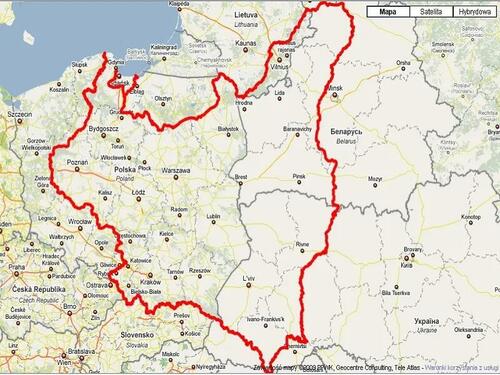Authored by Andrew Korybko via substack,
Belarusian President Alexander Lukashenko, who was just re-elected on Sunday for his seventh term, warned about Poland’s alleged territorial plans for his country and Ukraine.
According to him, “Today you are eyeing western Belarus up to Minsk, you have already started talking about western Ukraine. You understand that you will not get an inch of territory from us. This is our territory.”
While Poland supports Ukraine against Russia and backs regime change in Belarus, it’s unlikely to send troops to either country.
Zelensky himself lamented last week that the Europeans won’t dispatch any peacekeepers to Ukraine like he demanded during his speech at Davos unless the US approves, let alone unilaterally launch a conventional military intervention in his support while the conflict remains ongoing. That’s because Russia earlier threatened to target any unauthorized foreign troops that enter Ukraine, which one of its senior diplomats just reaffirmed over the weekend amidst increased talk of this scenario.
Some Polish nationalists want to restore Warsaw’s Commonwealth-era control over parts of what’s nowadays Belarus, Ukraine, and Lithuania, but they’re a fringe minority, and the state has always sought to establish a sphere of political and economic influence instead of annex their lands. This has been Poland’s policy since 1991 after it accepted its post-World War II eastern borders, which took the form of bilateral cooperation, the Eastern Partnership, the Three Seas Initiative, and the Lublin Triangle.
The reasons were pragmatic since those modern-day countries’ historically indigenous Polish minorities were expelled and coerced to leave en masse after World War II. Additionally, Poland wanted to replicate interwar leader Jozef Pilsudski’s Intermarium policy of creating a buffer zone of subordinated states between it and Russia, which failed at the time due to the territorial compromise that ended the Polish-Bolshevik War (partitioning Belarus and Ukraine) and Lucjan Zeligowski’s (fake) mutiny over Vilnius.
Reviving territorial claims against those three – and especially without any significant Polish minority on the ground to back them up except in Belarus (though many there are considered to be “Sovietized Poles” who want to remain under Minsk’s writ) – would therefore once again ruin these plans. Poland’s hypothetical annexation of Western Ukraine would also radically reshape its demographics, lead to the inclusion of a large hostile minority within its borders, and spike the risk of interwar terrorism returning.
Western Ukraine was one of the cradles of Polish Civilization after many military, political, and artistic leaders came from there since it was incorporated into Poland in the mid-1300s, but Kiev already gave Poles visa-free privileges, so they can visit its historical sites without having to first annex them. The same goes for fellow EU member Lithuania and even Belarus, which also granted Poles visa-free privileges too, albeit for a lesser duration (90 days in a calendar year instead of 180 total days).
The socio-cultural motivation for annexing those countries’ territories where Poles were historically indigenous for centuries prior to the end of World War II is therefore neutralized, which pairs with the aforementioned political-strategic arguments against this for making such a scenario very unlikely. The contemporary military situation also precludes Poland unilaterally launching a conventional military intervention since it would be crushed by Russia unless the US promised to defend it per Article 5.
Therein lies the primary obstacle to the annexation scenarios that Lukashenko warned about since Trump is unlikely to extend such guarantees to allies’ troops in third countries who deploy there without his permission since he doesn’t want the US to get dragged into a war with Russia.
This means that even if Polish-backed militants destabilize Belarus like the latter claimed that it’s plotting to do late last year as explained here, it won’t be able to follow up by sending in what’s now NATO’s third-largest army.
For these reasons, while it’s true that “Poland pursues the most aggressive and bad policy against Belarus” exactly as Lukashenko said on Sunday, it’ll only send troops to there and/or Ukraine with Trump’s approval but he’s unlikely to greenlight this and Poland is even less likely to defy him. With this insight in mind, his remarks serve to raise awareness of the unconventional threat that Poland poses to Belarus and therefore by extension to Russia, but nobody should expect it to take a conventional form.
